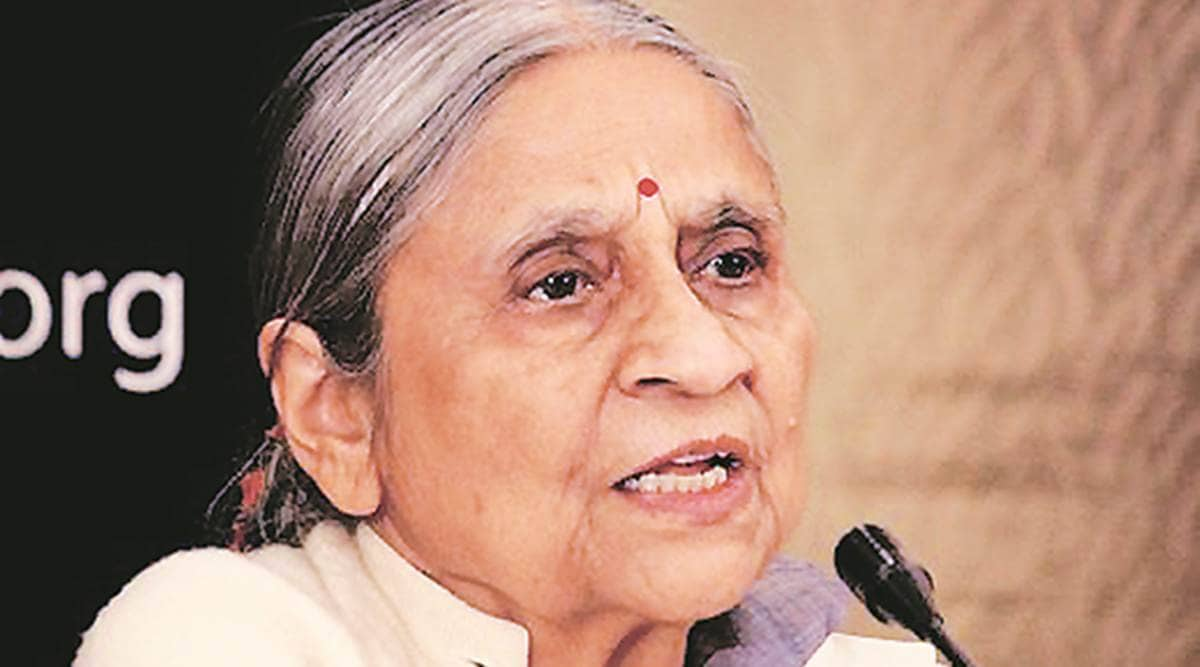 Elaben, as she was called, founded SEWA, one of the biggest women's cooperatives and national trade unions registered in 1972 which was born out of a textile trade union. (File photo)
Elaben, as she was called, founded SEWA, one of the biggest women's cooperatives and national trade unions registered in 1972 which was born out of a textile trade union. (File photo)or Elaben as she was popularly known, was a product of the early days of Independence. Inspired by Gandhiji and the atmosphere of hope and excitement for the future, she studied law in Surat and saw her future as a participant in building a new India. “For me, nation-building meant reaching the workers. They are the foundation of the nation and yet remain poor and neglected”, she said.
Elaben was deeply inspired by Ramesh Bhatt, a student leader, who she later married and who became her emotional and intellectual companion. After graduation, Elaben joined the Textile Labour Association (or Majoor Mahajan) and Rameshbhai joined the Gujarat Vidyapeeth in Ahmedabad. The TLA, a trade union of mill workers founded by Anasuya Sarabhai and whose constitution was written by Gandhiji, was Elaben’s learning ground. There, she learnt the elements of organising, of the importance of a trade union — poor people and workers coming together to give each other strength to create a voice and to negotiate for rights. It was here that she first met women from the unorganised or informal economy, women who pulled carts or sold vegetables or stitched garments, and saw how poor and yet hardworking they were.
The Self-Employed Women’s Association or SEWA was her creation. Starting as a small organisation in 1972, it has been built into a nationwide, indeed a worldwide, movement of women working at the base of the pyramid. She often recalled how she organised a meeting with women vendors and cart pullers who said, “We want a Majoor Mahajan of our own”. She was amazed when they all opened their little bundles and pulled out 25 paise each as a contribution to their new union. However, as she worked closely with these women, Elaben realised that just fighting for rights was not enough. There were no laws protecting them and the mindset of employers, and of the authorities such as the municipality and police, was exploitative.
Elaben had visited Israel a few years previously and seen the working of cooperatives with trade unions. As she thought about how she could truly help these women, she began to work with the idea of creating cooperatives. But where to start? Unlike today, there was no financial inclusion for them. They had nowhere to put their savings and collected notes were often eaten up by rats or stolen by family members. They had to get their loans from moneylenders at unimaginable interest rates. And yet when she tried to link them with the newly nationalised banks, they faced mostly rejections.
Elaben often recalled a large meeting of the women on the banks of the Sabarmati river where they told her “We are poor but so many in number that we can collect shares and form our own bank”. And Elaben had the courage, indeed the audacity, to help the women form a cooperative bank.
She has been called a gentle revolutionary. Both her ideas and her actions were revolutionary. She gave the world the path with which to reach out and change the lives of the poorest and she called it “Struggle and Development”. This path has been replicated not only in Gujarat where she began but all over India and even in many parts of the world.
As a revolutionary she realised that actions alone were not enough, the main problem, as she said, was “mindsets”. She needed to change the ideas and mindsets reflected in laws, policies and attitudes. She became an articulate spokesperson for these invisible women.
Recognition and honours began to arrive. In 1977, she won the Magsaysay award, later the Padma Shri and the Padma Bhushan. She was appointed as a nominated member of the Rajya Sabha; at the international level, she was honoured with degrees from Harvard and Yale. She was appointed as a member of “The Elders”, an international group started by Nelson Mandela. And through all this, her only concern was to promote the cause of her women. As a Rajya Sabha member, she introduced bills for street vendors and home-based workers. Through her efforts, the Street Vendors Bill did become law. When she received the Padma Shri, the only thing she asked for was a Commission on women in the unorganised sector. She produced the first All-India study called Shram Shakti in 1988, a classic even today.
Elaben recognised the importance of organising workers. What she started in Ahmedabad, she brought to the rest of the world, inspiring international federations of street vendors, home-based workers, domestic workers, and rag pickers. She made her presence felt in international forums such as the International Labour Organisation where she succeeded in getting a Convention for home-based workers. Recognising the need to change mindsets world wide she founded WIEGO an international network of researchers, policymakers and activists.
Perhaps Elaben’s greatest achievement is that she changed millions of lives. Empowering poor working women, but also many educated and professional women who joined her movement and took it forward. Last year, SEWA celebrated 50 years of achievement, but Elaben, at the age of 88 was still looking ahead: “Let us think of what change we want to bring in the next fifty years, who are the people we need and let us inspire many women as well as men to join us in that change.”
The writer is national coordinator, SEWA